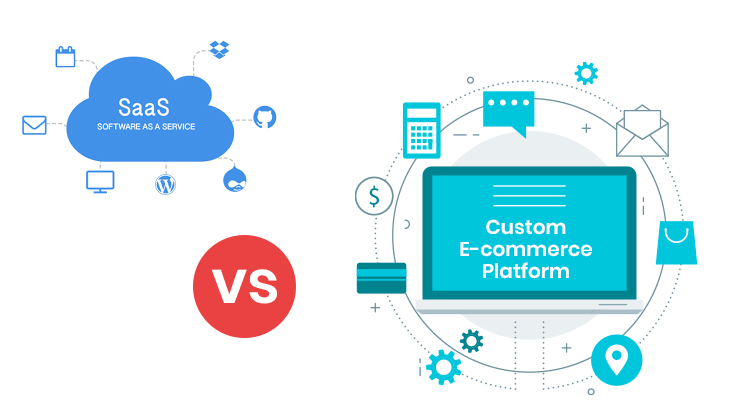eCommerce has become an integral part of modern businesses, and choosing the right development platform is crucial for success. When it comes to eCommerce development, there are two primary options: custom-built solutions and open source platforms.
Custom eCommerce Development
Custom eCommerce Development refers to the process of building an online store from scratch, tailored specifically to the unique needs and requirements of a business. Rather than relying on pre-built frameworks or platforms, custom development allows businesses to have complete control over the design, features, functionality, and user experience of their eCommerce stores
Here are some key points to consider when evaluating the custom development option :
● Flexibility and Scalability :
Custom developments offer unparalleled flexibility, allowing businesses to design and develop their online store according to their specific requirements.
It ensures complete control over features, design, and functionality. Additionally, custom solutions can be easily scaled as the business grows, accommodating future needs and expansion.
● Unique Branding and User Experience :
With a custom eCommerce platform, businesses can create a unique branding experience that aligns with their vision .
It enables customization of the User Interface (UI) and User Experience (UX) elements, resulting in a tailored shopping experience that enhances customer engagement and satisfaction.
● Integration with Existing Systems :
For businesses that already have established systems such as inventory management , CRM, or ERP solutions, custom development offers the advantage of seamless integration.
Developers can build custom APIs and integrations to connect the eCommerce platforms with existing software, ensuring smooth data flow and streamlined operations.
● Enhanced Security and Performance :
Custom eCommerce development allows businesses to prioritize security and performance based on their specific needs.
Developers can implement robust security measures and conduct thorough testing to ensure the platform is secure against potential vulnerabilities.
Additionally, by optimizing the code and infrastructure, custom solutions can be designed to deliver optimal performance, providing a fast and reliable shopping experience for customers.
● High Initial Investment :
Building a custom eCommerce platform requires a significant initial investment. the development process involves hiring experienced developers, designers, and the testers who can create a robust and secure solution.
Additionally , ongoing maintenance and support costs should be factored in when considering a custom solution.
● Time-Intensive Development :
Developing a custom eCommerce platform is a time-consuming process. From gathering requirements to designing, coding, and testing, it requires a substantial amount of time and effort. This can delay the launch of the online store and impact time-to-market.
Open Source eCommerce platforms
Open source eCommerce platforms provide pre-built frameworks or software that are freely available to the public, allowing businesses to create and customize their online stores.
Let’s explore the advantages and disadvantages of open source platforms:
● Cost-Effective Solution :
One of the significant advantages of open source platforms is their cost-effectiveness. These platforms are generally free to use , eliminating the need for large upfront investments.
However, it’s important to consider the costs associated with customization, hosting, maintenance, and ongoing support.
● Vast Community Support :
Open source platforms benefit from a vast community of developers who contribute to their continuous improvement.
This active community provides access to plug-ins, extensions, and themes, allowing businesses to extend the functionality and design of their online stores.
● Quick Development :
Open source platforms offer faster deployment options compared to custom development.
With pre-built templates and functionalities, businesses can launch their online stores relatively quickly.
However, extensive customization may still require development expertise and time.
● Limited Customization Options :
While open source platforms provide a good starting point, they often have limitations when it comes to customization.
Businesses may find it challenging to implement unique features or design elements that are integral to their brand identity .
This can impact the overall user experience and limit long-term scalability.
● Ecosystem of Add-ons:
Open source eCommerce platforms typically have extensive ecosystems of add-ons and extensions developed by both the platform’s creators and the community.
These add-ons can enhance the functionality and features of the online store, such as payment gateways, shipping integrations, marketing tools, and analytics plug-ins.
The availability of a wide range of add-ons allows businesses to customize their store’s capabilities without having to build everything from scratch.
Conclusion :
Choosing between built custom eCommerce solutions and open source platforms depends on various factors such as budget, timeline, scalability, and customization needs.
Custom development offers unmatched flexibility, branding opportunities, and scalability but requires a significant investment of time and resources.
Open source platforms provide a cost-effective and quicker solution, but businesses might face limitations in customization and long-term scalability.
Ultimately, businesses must carefully evaluate their requirements and goals to select the most suitable eCommerce development platform that aligns with their specific needs.












